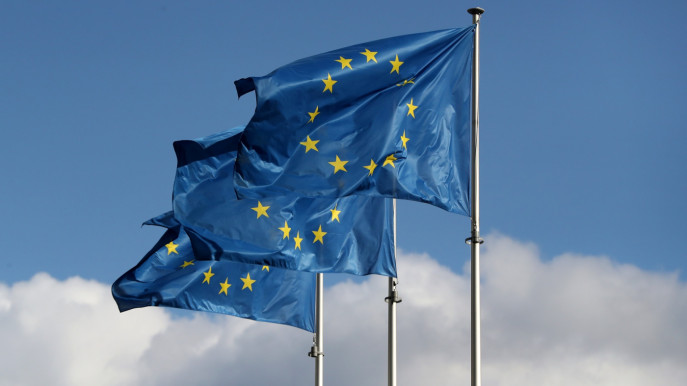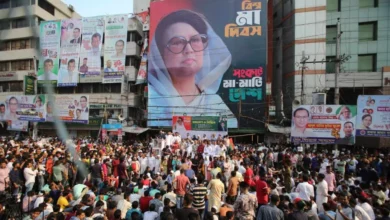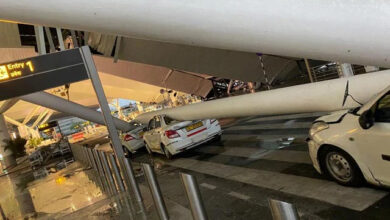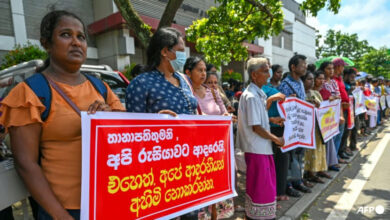EU isn’t sending full team of observers for next Bangladesh JS polls
On 9 July this year, a six-member Election Exploratory Mission (ExM) of the EU delegation which visited Bangladesh to observe the political situation in the country prior to the national election.

European Union flags fly outside the EU Commission headquarters in Brussels, Belgium September 19, 2019/ Reuters
Dhaka: The European Union has decided not to send a full-fledged observation team during Bangladesh’s upcoming national elections due to “budgetary constraints,” said Election Commission Secretary Md Jahangir Alam.
“The EU will not be sending a full-fledged observation team due to budgetary constraints in FY2023-24,” the EC secretary told reporters on Thursday.
However, media reports that the reason behind the EU not sending an observation team is the lack of a conducive environment for free and fair elections.
Quoting an email sent by the EU to the Election Commission, EC secretary Jahangir said the EU thanked the Election Commission for the fruitful meetings of the EU delegation that visited Bangladesh in July and hoped to keep in regular communication with the commission.
The EU also did not send any observers in the last two national elections in 2014 and 2018, with the last such visit during the 2008 elections.
A week ago on 14 September, Members of European Parliament (MEPs) called on the Bangladesh government to restore a safe and enabling environment for NGOs, human rights defenders, activists and religious minorities while expressing deep concern at the deteriorating human rights situation in Bangladesh.
On 9 July this year, a six-member Election Exploratory Mission (ExM) of the EU delegation visited Bangladesh to observe the political situation in the country prior to the national election.
The EU mission mainly wanted to know whether the country’s condition is conducive for fair elections considering the last two national polls, the risk of violence, the existence of sufficient legal framework, capacity and preparedness of the Election Commission, press freedom and freedom of expression in the country.
In the weeks since the delegation’s arrival, they held meetings with high officials of government bodies including the foreign ministry, National Human Rights Commission (NHRC), Bangladesh Police, Ministry of Chittagong Hill Tract Affairs, the attorney general, home affairs, information ministry, and law ministry.
During these meetings, the EU mainly inquired about the possibility of violence before the upcoming national election, poll time security measures, and the overall human rights situation.
The EU delegation met a number of civil society members, some of whom made clear that they still questioned whether a level playing field could be created under the current process.
The delegation also held a series of meetings on 15 July with the major political parties, where each made their position clear.
While the BNP reiterated the demand for a caretaker government, which the Jamaat-e-Islami also supported, the Jatiya Party chose to strike a balance, urging the government to sit for dialogue.
The ruling Awami League, as always, said the election-time government would be formed only under Prime Minister Sheikh Hasina.
In a meeting with top journalists of the country, the EU was made aware of the concerns regarding the Digital Security Act.
Reason behind EU not sending observation team in 2018 election
In 2018 also, the European Union did not send an observation team during the national election citing a plethora of reasons.
The then EU Ambassador to Bangladesh Rensje Teerink said it is quite expensive to send a credible observer mission as it requires a large number of observers and months of preparation.
“We have therefore decided not to send a team this time round. That doesn’t mean that we’re not going to follow these elections. We will definitely be paying close attention to the developments in the country,” she said in an interview with DW.
She also said, “One of the most important criteria is the time span available to us to carry out the mission. Then, there are security constraints in certain places. So there are multiple criteria we consider before taking the decision.”
What EU mission said after 2008 election
On 11 January 2007, the EU Election Observation Missions (EOM) and other international observer missions judged that conditions precluded credible elections and suspended their activities.
The same day then-president Iajuddin Ahmed, under pressure from the army, cancelled the elections, resigned as chief advisor of the caretaker government, and declared a “state of emergency”. A new caretaker government was appointed to prepare for credible and participatory elections and took office for an unspecified period of time.
The overall conclusion of the 2008 parliamentary elections marked an important step in the restoration of democratic governance to Bangladesh, the EU said in its final report on the observation.
The report stated, in accordance with EU election observation methodology, the EU EOM to Bangladesh assessed the conduct of the JS elections in line with international standards and best practice for democratic elections.
Minor technical difficulties aside, the EU EOM concluded that professionalism, transparency and credibility were the hallmarks of the election and that the election broadly met international standards.
The outcome of the election appears to reflect the will of the people of Bangladesh and EU EOM observers did not report patterns of fraud in the process, said the EU report.



![Mumtaz Zahra Baloch, spokesperson for Pakistan's Foreign Ministry, says the country believes in constructive dialogue with the US [Courtesy of Pakistan Ministry of Foreign Affairs]](https://southasiancorrespondent.com/wp-content/uploads/2024/06/pak-1-390x220.jpg)
